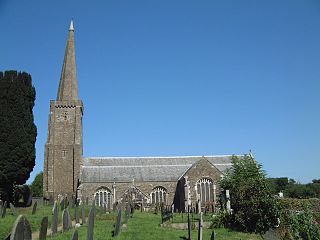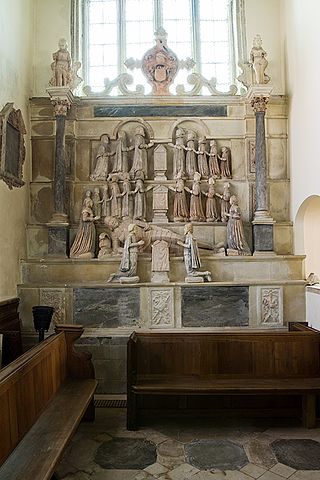

Flete House is a Grade I listed country house at Holbeton, in the South Hams region of Devon, England.


Flete House is a Grade I listed country house at Holbeton, in the South Hams region of Devon, England.

With roots in Saxon times, the Manor of Flete was held by the Damarell family from 1066 until the time of Edward III. The earliest part of the house dates from the sixteenth century, and was substantially rebuilt around 1620 for Sir Charles Hele. The Hele family held the house until 1716, when the estate passed to the Bulteels. Additions were made to the house in both the early and the late eighteenth century. The house was heavily remodelled in the Gothic style in 1835 by John Crocker Bulteel, which obliterated the early and late eighteenth century classical work and added castellations.
In 1878 the architect Richard Norman Shaw undertook extensive building works for Henry Bingham Mildmay, remodelling and extending the house, while retaining the sixteenth/seventeenth century house to the south west. [1]

Flete House was used by the City of Plymouth as a maternity hospital during and after the Second World War. At the start of the war, the estate was in the hands of Lieutenant-Colonel, the Lord Mildmay of Flete. The first baby was born on 14 July 1941, and by the end of 1941 there had been a further 124 births. Lord Mildmay remained in residence at the House until his death in 1947 and was apparently often seen in the Wards. [2]
Dave Hill of the pop group Slade was one of the babies born at the House, in 1946. [3] The hospital closed on 8 May 1958, less than a month after the last baby was born there, and the house was returned to the Mildmay family in 1959. [2]
In 1979 Flete House was used as the location for the BBC TV series Penmarric , the house represented the house of the title.[ citation needed ] More recently, the Hall was owned by the Country Houses Association until it went into liquidation in 2003. [4] [5]
The hospital closed in May 1958, less than a month after the last birth there. Flete House was returned to the Mildmay family in 1959. For a time, the house was managed by the Country House Association, before being converted into an Audley luxury retirement development in 2005.
Currently Flete House is a retirement village with stylish apartments and beautiful surroundings.

Yealmpton is a village and civil parish in the English county of Devon. It is located in the South Hams on the A379 Plymouth to Kingsbridge road and is about 8 miles (13 km) from Plymouth. Its name derives from the River Yealm that flows through the village. At the 2001 census, it had a population of 1,923, falling to 1,677 at the 2011 census. There is an electoral ward of the same name. The population of this ward in 2011 was 2,049.

The Erme is a river in south Devon, England. From its source on Dartmoor it flows in a generally southerly direction past some of the best-preserved archaeological remains on the moor. It leaves the moor at the town of Ivybridge and continues southward, passing the settlements of Ermington, Modbury and Holbeton. Near Holbeton it becomes a ria and empties into the English Channel in Bigbury Bay, between the rivers Yealm and Avon.

David John Hill is an English rock musician. He is the lead guitarist, a backing vocalist and the sole continuous member in the English band Slade. Hill is known for his flamboyant stage clothes and hairstyle.
The Office of the Lord Lieutenant was created during the reign of Henry VIII (1509–1547), taking over the military duties of the Sheriffs and control of the military forces of the Crown. From 1569 there was provision for the appointment of Deputy Lieutenants, and in 1662 the Lord-Lieutenant was given entire control of the militia. The Regulation of the Forces Act 1871 transferred this function back to the Crown, and in 1921, the office lost its power to call upon men of the county to fight in case of need. Since 1711 all the Lord Lieutenants have also been Custos Rotulorum of Devon.

Poltimore House is an 18th-century country house in Poltimore, Devon, England. The Manor of Poltimore was from the 13th to the 20th century the seat of the Bampfylde family, which acquired the title Baron Poltimore in 1831. The house retains much of the fabric of earlier buildings on the site erected by the family. It is designated a Grade II* listed building.

Holbeton is a civil parish and village located 9 miles south east of Plymouth in the South Hams district of Devon, England. At the 2001 census the parish had a population of 579, down from 850 in 1901. By 2011 it had increased to 619.

Francis Bingham Mildmay, 1st Baron Mildmay of Flete, TD, DL was initially a Liberal and later a Conservative politician who sat in the House of Commons from 1885 until 1922 when he was raised to the peerage.
Anthony Bingham Mildmay, 2nd Baron Mildmay of Flete was an English amateur steeplechaser, who raced in the Grand National. He also inspired the Queen Mother's interest in National Hunt racing.

Elize Hele (1560–1635) of Fardel in the parish of Cornwood, Devon and of Parke in the parish of Bovey Tracey, Devon, was an English lawyer and philanthropist. In 1632 he transferred his lands into a trust intended for "pious uses", from which charitable action and in order to distinguish him from his many prominent relations, he became known to posterity as "Pious Uses Hele", which his biographer Prince looked upon "as a more honourable appellation than the greatest empty title". The trustees included his wife, together with John Hele and a number of friends. The trust was used to create a number of schools in Devon including Plympton Grammar School.

Sir Thomas Hele, 1st Baronet was a landowner from Devon and MP on various occasions from 1626 to 1670. A Royalist during the 1642 to 1646 First English Civil War, he raised a regiment of cavalry which served in the West Country and sat in the Oxford Parliament.

Sir John Hele of Wembury in Devon, serjeant-at-law, was a Member of Parliament for Exeter and was Recorder of Exeter (1592–1605). He was one of Prince's Worthies of Devon (1701). He built at Wembury one of the grandest manor houses ever seen in Devon, called by his near contemporary Risdon : "A magnificent house, equalling, if not exceeding, all other in these western parts, for uniform building; a sightly seat for shew; for receipt spacious; for cost sumptuous; for sight salubrious". It was already a ruin by about 1700, and was finally demolished in 1803. He founded a boys' hospital in Plymouth. His monument and effigy survives in Wembury Church.
Sir John Perring, 1st Baronet, FSA, of Membland in the parish of Holbeton, Devon, was a Member of Parliament and served as Lord Mayor of London in 1803. He was a commissioner for exchequer bills and senior partner of the banking firm John Perring, Shaw, Barber & Co., which having suffered in the Panic of 1825, resulted in Perring losing his estates. On 3 October 1808 he was created a baronet, first of the Perring baronets of Membland, Devon.

John Crocker Bulteel (1793–1843) of Fleet, Holbeton, in South Devon, was a Whig MP for South Devon 1832-4 and was Sheriff of Devon in 1841. He was Master of the Dartmoor Foxhounds and bred the finest pack of hounds in England.
Henry Bellenden Bulteel was an English priest with radical opinions. He studied at the University of Oxford and became an Anglican curate in Oxford. He adopted High Calvinist opinions, and in 1831 gave a polemic sermon before the university in which he questioned received opinions on free will and salvation, and criticised the university and the Church of England for ignoring the principles of their faith and appointing unsuitable clergy in response to political influence. He then went on an outdoor preaching tour, and as a result was ejected from the Church of England. He formed his own nonconformist church and flirted with Irving's Catholic Apostolic Church before setting up a Strict Baptist chapel.

Lyneham in the parish of Yealmpton in Devon, is an historic estate. The surviving grand mansion house known as Lyneham House is a grade I listed building. It was built c.1699-1703 by Sir Courtenay Croker, MP for Plympton Morice in 1699. A drawing of Lyneham House dated 1716 by Edmund Prideaux (1693–1745) of Prideaux Place, Padstow, Cornwall, survives at Prideaux Place. It shows formal gardens in front with flanking pavilions and an orangery.

Membland is an historic estate in the parish of Newton and Noss, Devon, situated about 8 miles south-east of the centre of Plymouth. The estate was purchased in about 1877 by Edward Baring, 1st Baron Revelstoke (1828–1897), senior partner of Barings Bank, who rebuilt the mansion house known as Membland Hall. He suffered financial troubles and in 1899 the estate and Hall were sold to property developer John Headon Stanbury. A year later Membland was sold to ship builder William Cresswell Gray. The house became derelict after World War I and was demolished in 1927. Several of the estate's service buildings survive, including the Bull and Bear gatekeeper's lodge, stables, gasworks, forge and laundry. On the site of the house a smaller dwelling was built between 1966 and 1968.

John Bulteel of Westminster, served twice as a Member of Parliament for Lostwithiel in Cornwall, from 1661 to 1669. Between c.1658 and 1667 he was Secretary to Edward Hyde, 1st Earl of Clarendon, Lord Chancellor to King Charles II from 1658, two years before the Restoration of the Monarchy, until 1667. He was a friend of the diarist Samuel Pepys. He died unmarried.
Flete in the parish of Holbeton in Devon is an historic manor. In 1810 it was called "one of the finest estates in the county of Devon". The present manor house known as Flete House was built in the 19th century incorporating some elements of an earlier Tudor house on the site.

Radford in the parish of Plymstock in Devon is a historic manor and the oldest recorded seat of the prominent Harris family. It is today a low-cost housing suburb of the City of Plymouth. The 16th century manor house of the Harris family was remodelled in the 18th century and was demolished in 1937. However, various traces of the estate remain, including most notably the deerpark, now a public amenity known as Radford Park, with its large lake, an early 19th century gate-lodge at the entrance drive to the former mansion house, with gatepiers, on Radford Park Road, a bridge and boathouse with follies of a sham castle and another sham-ruin.

Thomas Fones of the parish of St Andrew's in the City of Plymouth in Devon, was a merchant who served as Mayor of Plymouth in 1610 and 1619. He was the first of his family to have settled in Devon, and his descendants rose to prominence as members of the Devonshire gentry and as Members of Parliament. In 1746 his great-great-great-grandson Henry Fownes Luttrell (c.1722-1780), High Sheriff of Somerset from 1754 to 1755, and a Member of Parliament for Minehead from 1768 to 1774, married the heiress Margaret Luttrell, and inherited Dunster Castle in Somerset with the extensive Lutterell estates and added his wife's name to his own to comply with the terms of her father's will. He built almshouses near the Great Hill in Plymouth.